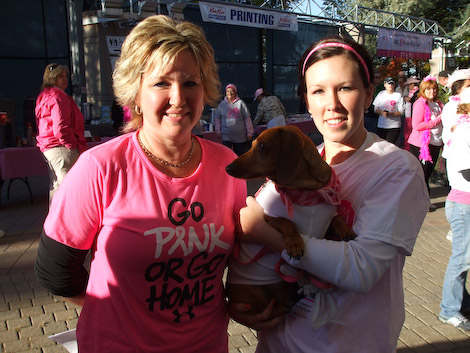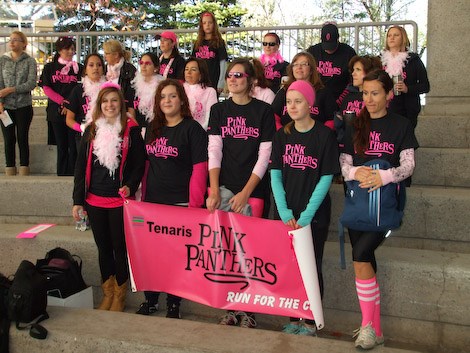 There were hugs and tears, but also a lot of well-deserved applause and cheers for determined, positive-minded breast cancer survivors who were joined by family, friends and community figures at the Roberta Bondar Pavilion Sunday morning.
There were hugs and tears, but also a lot of well-deserved applause and cheers for determined, positive-minded breast cancer survivors who were joined by family, friends and community figures at the Roberta Bondar Pavilion Sunday morning.
It was a sunny day for people to take part in the Canadian Breast Cancer Foundation CIBC Run for the Cure.
It was the 14th year for the fundraising event in Sault Ste. Marie.
Canadian Breast Cancer Foundation Co-Run Director, Trish Porco, of the Foundation’s Sault office, told SooToday.com that by 9:15 a.m. over 600 people had registered for this year’s event, as individuals or as team members, but approximately 700 were expected by the time the run was set to start at 10 a.m.
Locally, last year’s run had over 780 participants and more than $114,000 for breast cancer research.
Province-wide, more than 60,000 participants raised over $13 million in 2011 Run for the Cure events.
Over the past 16 years $844,000 have been raised in Sault Ste. Marie.
Funds raised stay within the Ontario region for research, education and awareness.
After participants finished registering - many of them sporting pink clothing and pink hair in keeping with the event’s traditional colour - opening ceremonies got underway with the singing of ‘O Canada,’ a brief message from Sault MPP David Orazietti (wearing a flashy pink wig!), and an inspiring speech from local breast cancer survivor, Angelisa Mills (pictured, left).
After a warm-up, those taking part ran east toward Bellevue Park and back to the Pavilion, while others walked west along the boardwalk, to the Canal and back.
Mills told SooToday.com: “I was diagnosed in 2008 at the age of 40, and it scares the heck out of you. I decided I was going to beat this, and that’s where I am today, and I would like to give anybody any kind of help I can give them.”
Angelisa is an employee of Collegiate Heights Retirement Residence, and the Collegiate Heights team was one of the biggest taking part in Sunday’s Run.
"My mother was diagnosed with breast cancer about a year and a half before I was, and my spouse’s mother was diagnosed after that,” Mills continued. “Its very important for women to get themselves checked and do what they need to do. Early detection is very important. My relatives are survivors too. Breast cancer can be beaten, but you have to be very positive. A positive attitude certainly does make a big difference.”
“I saw both sides of it," she explained. "When I was in Sudbury for radiation, I found it very hard to see some people were just giving up. I wish they had been more positive and fought the battle, because it can be won.”
Canadian Breast Cancer Foundation information states in 2012 an estimated 22,700 women will be diagnosed with breast cancer.
That’s more than 430 every week.
It is the most common cancer in Canadian women over the age of 20, more than 25 percent of all cancer cases in Canadian women.
It is estimated 5,100 women will die from breast cancer this year.
However, the number of Canadian women dying from breast cancer has decreased by almost 40 percent since the 1980s, thanks to advances in screening, diagnosis and treatment.
Sault Ste. Marie Canadian Breast Cancer Foundation Co-Run Director Trish Porco told us: “One in nine Canadian women will be diagnosed with breast cancer during her lifetime, affecting more and more women and also affecting younger women. Generally it was an age 50 and over disease, but now its happening to even younger women, so this is why we’re here.”
“This fundraiser is not only for research but also for education, to make sure we’re educating our women so that they know what’s happening and how to prevent it, to reduce their risks," she said. "Don’t smoke, drink in moderation, physical exercise is important, along with diet, check ups and mammograms of course. Get mammograms at an earlier age. It depends on family history and your own medical history, but generally a woman should start getting mammograms at about age 45.”
"We’ve made significant strides, we are seeing more and more survivors every year with different chemotherapy and radiation treatments,” Porco said. “We are seeing more reasons to celebrate.”
Join SooToday+
- Messages
- Post a Listing
- Your Listings
- Your Profile
- Your Subscriptions
- Your Likes
- Your Business
- Support Local News
- Payment History
SooToday+ members
Already a +member?
Not a +member?
Sign up for a SooToday+ account for instant access to upcoming contests, local offers, auctions and so much more.
